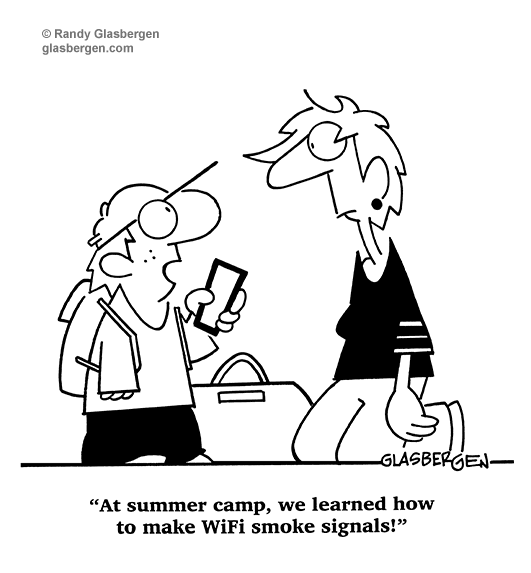- Remember the bidding.
- Estimate your partner’s points.
- Keep track of both the high cards and the # of cards in each suit played.
- Ask yourself “what could go away?”
- Ask yourself how you can help your partner.
- Pay attention.
- Stop and think.
- Do not play by rote, rule, or habit.
 Here are a couple of common situations. If you have never had these or similar problems, you are either charmed and blessed or you are not thinking and worrying enough. Grin. It is your lead against 3NT. You lead a fourth-best spade from AT8xx.Dummy has two or three small cards in the suit, partner plays the Jack,declarer wins the King. Now declarer leads clubs until you choose to win yourAce (partner gives count). It’s dilemma time. Who has the Queen? Should you continue spades, hoping partner has the queen, because you will feel like an idiot if you don’t set this contract? Or should you lead a different suit, trying to get to partner so that he can lead spades through the declarer’s possible Qx? Your partner leads the three of spades against 3NT. Dummy has the 467. You play the Queen from Q5, declarer wins the King. Now declarer leads clubs and you take your Ace. If partner had the AT832 of spades, leading a spade sets this contract right now, as declarer has J9 left. But if partner led fromA983, J983, or any three-card suit, then perhaps you should switch to your Queen of diamonds from QJTxx, Aggghhhh.
Here are a couple of common situations. If you have never had these or similar problems, you are either charmed and blessed or you are not thinking and worrying enough. Grin. It is your lead against 3NT. You lead a fourth-best spade from AT8xx.Dummy has two or three small cards in the suit, partner plays the Jack,declarer wins the King. Now declarer leads clubs until you choose to win yourAce (partner gives count). It’s dilemma time. Who has the Queen? Should you continue spades, hoping partner has the queen, because you will feel like an idiot if you don’t set this contract? Or should you lead a different suit, trying to get to partner so that he can lead spades through the declarer’s possible Qx? Your partner leads the three of spades against 3NT. Dummy has the 467. You play the Queen from Q5, declarer wins the King. Now declarer leads clubs and you take your Ace. If partner had the AT832 of spades, leading a spade sets this contract right now, as declarer has J9 left. But if partner led fromA983, J983, or any three-card suit, then perhaps you should switch to your Queen of diamonds from QJTxx, Aggghhhh.
The Smith Echo
The Smith echo (in its most basic form) says this. Against notrump, declarer is going to attack a suit. Instead of giving count in that suit, give your attitude towards the suit your side orignally led! Playing high-low means you LIKE the suit, and partner should lead it when they gain the lead. Playing lowhigh (up the line) suggests that partner lead something else. (Important note: this applies ONLY to the first suit declarer leads.) On the first problem, partner should tell you if he has the Queen, because he realizes that you cannot tell. On the second problem, partner (the leader) should tell you if he is currently excited about his spade lead, or whether looking in another direction is OK. Folks, I have bad news: THE SMITH ECHO REQUIRES THINKING! Sorry about that. If you are (still) looking for the magic signaling system that is going to make your life so easy that you can defend brilliantly without thought, you are out of luck. Playing the Smith Echo requires MORE thinking than not playing it. It just makes some formerly unsolvable problems solvable. Next Article: “Trump suit preference.” Until then… Cheers, Jack Brawner (Trojanowl@aol.com)Two Signals to Help Your Defense (part two)
Well, last article — the Smith echo — certainly generated a lot of Emails! There was Shirley’s most gracious letter of appreciation for explaining a signal that her partners had been trying to persuade her to play. On the other hand, there was Jack’s follow-up “I have found the exception” question followed by his complete dismissal of the Smith echo’s usefulness. No problem. I am here to offer a bridge buffet. I put out the items, you take what you want. Is there anyone out there playing EXACTLY what I choose to play? Nope. Not even ME, as my partners are allowed to have preferences also. (Are yours?) It is difficult to find an expert pair that does not play the Smith (or “Reverse Smith”) echo. It is also difficult to find an expert pair where both partners do not count out every hand, execute defensive swindles, falsecard regularly, break up squeezes, etc., etc. The Smith echo is a fairly high-level tool, and it does NOT make the game easier. I find this interesting, though: why are so many of the same players who want to play every screwy discarding system that comes down the pike so resistant to giving up natural count for ONE round of play? I suspect it is because many of us worked SO very hard on being good “count-givers” that we are reluctant to tinker. And that makes a good segue into…“Trump Suit Preference”
((Author’s warning: I am going to make a STRONG case for this one. I believe this signal will improve the game of anyone who adopts it. It is straightforward, effective, and comes up very frequently.)) Frequently, when you are defending a hand, there is a trump suit. In the good old days, perhaps we would high-low with trump to show three of them. Perhaps we only executed this “trump peter” when we wanted to ruff something. Once in a while, it was useful. Like, maybe, one hand a month? Can we do better? Yes. Trump Suit Preference (abbreviated TSP for the rest of this article) comes up nearly every time there is a trump suit. TSP works like this:WHEN FOLLOWING TO THE TRUMP SUIT, USE YOUR SPOTCARDS TO SIGNAL SUIT-PREFERENCE.If you high-low, it means you prefer a high-ranking suit. If you play up-the-line, it means you prefer a low-ranking suit. Is it that simple? Nearly. But some of you are already saying “wait just a cottonpickin’ minute! There are THREE other suits!” True. But in real life, one of the following three situations will almost always apply: •The opening lead was encouraged. Now you don’t need TSP. •The opening lead was discouraged, or it is obvious that a continuation of that suit is not best. Perhaps partner led from three or four small cards, and declarer just captured your only honor. Perhaps the dummy is now void, and giving declarer a free finesse seems wrong. Perhaps partner needs to get you in to lead through the declarer or dummy. There are many examples. But if it is likely wrong to continue the originally led suit, then there are only two non-trump suits left. Use TSP. •Perhaps it is not so clear. Maybe we led trump, for example. Try this exercise. On the opening lead (or after the first trick), mentally eliminate one suit. (HINT: remember the bidding!) Then use TSP to show your preference for the other two. Partner will do the same. You will almost always agree on which suit to eliminate. Is all of this perfect? Heck, no. Sometimes I only have one trump. (Although I can then discard something useful on the second round). Sometimes I have a holding like Q-2, and situations where I can afford to drop the queen are rare. (With Q-5-2, I can play the five as being high, right? Partner may not realize it is high until I play the two next.) And sometimes I have no preference, but I still have to follow suit. (HINT: signal for the SAFEST suit.) Perfect? No. But sometimes it is magical. Partner leads a singleton diamond against a five spade contract, which declarer wins. Declarer leads trump and partner wins the Ace. Partner knows you have an Ace, either in hearts or clubs (they used Blackwood). Which one? If partner guesses right, he puts you in and you give him his ruff to beat the contract. If he guesses wrong, declarer draws trump and makes the contract. Does partner have a clue? Not normally. But if you are playing TSP, and you just played the TEN of trumps for some reason… Final thought for now: defensive signals are just like any bidding convention. You give something up in order to gain something. The question you ask yourselves with any convention is “Do we gain more than we lose”? For example, we have all agreed that giving up the ability to sign off in two clubs after our partner opens one notrump in order to use that new-fangled Stayman convention is well worth it. We give up very little to gain a lot. With TSP, like anything else, ask yourself these questions. What do we give up? (I do not think that giving up the ability to show count in the trump suit is a big deal — usually we know anyway from the bidding.) What do we gain? (Some hands, not much. Other hands, a great deal.) Which comes up more often? (In my humble opinion and personal experience, this is not even close.) Then play it for a while. Prediction: you will never go back. Excelsior! Bridge for the Club Player by Jack Brawner • TrojanOwl@aol.com published in the Sunshine Bridge, ACBL/District9 Bulletin News n° 5 and 6 2006
























